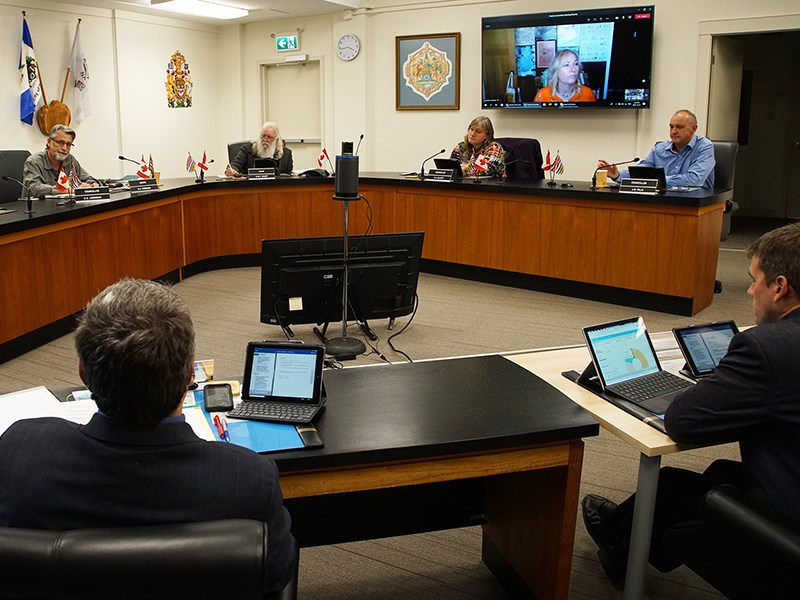City council has been urged to take steps to get its fiscal house in order.
In a letter to the city finance committee, resident Paul McMahon made what he called a “desperate appeal” to council to prevent Powell River from becoming a “financial calamity.”
“The chief financial officer has stated for the last two years in the financial plan that Powell River’s financial position is not sustainable, which is serious,” stated McMahon. “Add to that the new challenges of COVID-19 and the mill, which is not and has not been operational for five months, plus inadequate reserves, and you have the financial storm.”
McMahon asked if council would amend the 2021 budget assumptions to include department managers to present budget options for reductions in services, and that all non-essential projects and capital spending be placed on a two-year deferral.
At the October 22 finance committee meeting, councillor Rob Southcott said he appreciated the correspondence from McMahon and his long-term commitment to watching council.
“Council should be watched and I feel more comfortable when that’s happening, because it means people care,” said Southcott.
He added that when looking at increases in the city budget, there is sometimes referral to the consumer price index, or CPI, but from information he has received from financial professionals, the CPI is being abandoned. He said the CPI is generally around two per cent and the city has tried diligently to keep tax increases down to that.
“CPI is not regarded as an accurate indicator,” said Southcott. “Increases in costs are higher than the CPI. For municipal jurisdictions, the CPI is the wrong assumption. We work hard to figure this all out.”
Southcott said communities across the country are assuming greater responsibility for things that were the domain of senior governments, such as provincial and federal. He said this has been recognized by the Union of BC Municipalities, which brought out a report entitled Strong Fiscal Futures. One of the main recommendations was that there be other funding for municipalities that does not only relate to property taxation.
He said he had attended a Federation of Canadian Municipalities teleconference and the mayor of Victoria happened to mention that in conversation with the leader of the provincial NDP, there was serious consideration that could very well be a one per cent portion of sales tax coming to municipalities.
“The point I really want to make, and I absolutely agree with Mr. McMahon, this is not business as usual anymore,” said Southcott. “Stresses on us fiscally are increasing year after year. There has to be some new solutions and I do believe those solutions are coming because we are putting more responsibility on local government.”
Councillor Cindy Elliott said she was worried about Southcott’s comments because she had never seen a provincial government provide anything without offloading something along with it.
“I wonder what that would look like?” asked Elliott. “I’d be a little cautious celebrating that one.”
Elliott said assumptions for not cutting services are ones the city will be trying to do differently in the future. She said this year, the newly formed community finance advisory committee helps councillors come up with great ideas around finances.
She said the assumption that the city is providing services that are in some way wasteful in its spending isn’t something she’s seen.
“The way to cut costs is to cut services or find more revenue,” said Elliott. “That’s what we’re working hard to try and figure out. We’re not there yet.”
Finance committee chair and councillor George Doubt said the CPI has nothing to do with the cost of services the city provides. He said it’s an interesting number and people use it all the time, but it does not reflect increases in costs or increases in services the city is required to provide. He said the city faces additional costs over and above the CPI in carrying out its services.
“The city is entering into a budget process and we’ll be looking really closely, and each and every one of those departments will, to see what the directors think they need to have to provide services,” said Doubt. “We will make a decision as a council about what tax money to collect to pay for those services. If we decide to reduce taxes, very likely, that will mean reducing services and we’ll need to have the support of the community if that’s what they want us to do.
“I’m sure we’ll hear from people if we decide to reduce.”
Doubt said last year’s tax increases were an average of 4.7 per cent for a typical residential property and it’s going to be a job for council to keep it to that or less than that this year.
Doubt said he appreciated McMahon’s letter and it’s good to have somebody watching and paying attention.
“Council will have and does have a tough job in setting its budget and its taxation for next year,” said Doubt.
Council voted to receive the correspondence from McMahon.



